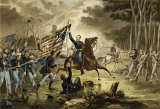Jefferson Davis, President of the Confederacy, figured that the Union's blockades would anger at least two major foreign nations that were buying goods from the Confederate States. What were the names of these two major nations?
replied to: Rynbow
Replied to: Jefferson Davis, President of the Confederacy, figured that the Union's blockades...
United states and alabama sorry if they are not right i tried my best
hope this helps
replied to: Rynbow
Replied to: Jefferson Davis, President of the Confederacy, figured that the Union's blockades...
They were Europe and Africa
replied to: Rynbow
Replied to: Jefferson Davis, President of the Confederacy, figured that the Union's blockades...
France and England primarily followed by Spain and Belgium.
The Confederacy actually sent three emissaries to London and Paris seeking trade agreements and recognition as a state, prior to the bombardment of Ft. Sumter, April 1861. The blockade of Southern ports was proclaimed in May of 1861. They were William L. Yancey, Pierre A. Rost and A. Dudley Mann. Napoleon III said France could not act without England. The Foreign Secretary of England gave the emissaries a cool reception and declined any further communications with them in November. The English could not abide the stench of slavery hanging over the Confederacy. The shortage of cotton not yet having been felt, the mills in England and France were running full-speed, President Davis was unsure whether any shortage there would "work a revolution....remained to be seen." Yancey resigned his post and returned home. Rost and Mann continued with their mission to Spain and Belgium.
Their positions in London and Paris were assigned to former U.S senators from Virginia and Louisiana James M. Mason and John Slidell who in November were in transit across the Atlantic on a British mail steamer the Trent out of Cuba. This ship was intercepted by the USS San Jacinto which knew Mason and Slidell were aboard and seized them. This act above any issue of cotton almost brought England and the United States to war. It was known as the Trent Affair. England's response was an ultimatum. Its terms were either an abject apology, including surrender of the seized Confederate emissaries, or war. Lincoln's response to his cabinet who were outraged from being dictated to by England said, "One war at a time." The U.S. apologized and returned the captives.

